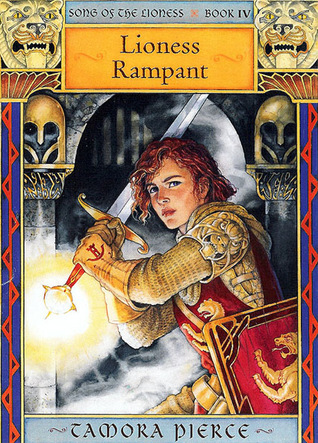
Alanna on the cover of the fourth book in the series, Lioness Rampant. For a great dissection of different cover art, try this blog.
Being a woman in a man’s world is never easy: now imagine that world is a fantasy kingdom in which chivalry, might, and the sword rule.
Tamora Pierce’s Song of the Lioness quartet follows Alanna, a young girl who wants desperately to escape the conventional life planned for her and become a knight.
D’you think I want to be a lady? ‘Walk slowly, Alanna. Sit still, Alanna. Shoulders back, Alanna.’ As if that’s all I can do with myself! –Alanna in Alanna: The First Adventure
There seems to be no way around her gender – no woman has become a knight before – so to get her training, she disguises herself as a boy and goes to the court of Tortall, in the place of her twin brother, who wants to become a sorceror. It’s interesting that it’s far harder for her to follow her dreams than it is for her brother. He goes to the convent, where she would have learnt to be a lady, but Thom has no need to cross-dress or to deceive anyone. Alanna, on the other hand, becomes Alan and has to spend the next eight years lying to her friends, avoiding public baths, and hiding the changes to her body as she hits puberty.
She also has to work far harder than her peers, as the smallest ‘boy’ in the group. She does extra training in her free time and learns to turn her ‘weaknesses’ (her size and her strength) to her advantage, by seeking out extra tuition from people outside the court and the chivalric code. There is no easy glory and Alanna never gets an easy ride – Pierce is realistic about the challenges that she faces in making the grade as a knight. Pierce is also realistic about what that means for Alanna’s physical appearance. Unlike other literary girl soldiers, who are often portrayed as model-beautiful rather than functionally strong (I’m looking at Game of Thrones…), Alanna is portrayed as stocky, scarred, and, like many women when compared to men, short.
So many of the female superheroes were superheroes because of magic. None of them was a superhero because she could hit a bad guy. I was tremendously frustrated. I wanted to see female sword-slingers most of all. –Tamora Pierce
Alanna is every bit the ‘sword-slinger’, but Pierce does give Alanna a hefty chunk of supernatural powers as well, both in the form of magic and a special relationship with the gods. Alanna is deeply suspicious of her ‘Gift’, but in many ways it becomes a metaphor for womanhood throughout the books.
Using my Gift doesn’t seem fair, somehow. It’s as if I’m fighting dirty. –Alanna in Alanna: The First Adventure
It takes a long time for Alanna to accept her girlhood and her Gift (which is strongest when she’s using it to heal, a stereotypically feminine profession). Throughout the books, it is clear that she is most powerful when she acknowledges all of who she is and allows herself to show it. However, having completely denied her gender to succeed in this man’s world, she associates knighthood with physical strength and masculinity – and nothing else. As a result, she is terrified of the things that force her to confront the other part of who she is: women’s clothing, sex, and love, for example.
Ye can be a woman and still be a warrior. – Coram, in Alanna: The First Adventure
It is intriguing that her male friends and fellow knights, when they learn that she is female, are far less worried about her gender than she is, and do not share her crushing self-doubt that her achievements so far, in the guise of a boy, are less valid when her true identity is revealed. As she goes adventuring, she also finds that she is not the only ‘woman who fights like a man’ – nor will she be the last. Once news of Alanna’s achievements spread, girls are seen playing at being knights in the streets and are officially given the opportunity to train as knights at court. But that’s another story…
Girl, boy, or dancing bear, you’re the finest page‚Äîthe finest squire-to-be‚Äîat Court. ‚ÄìJonathan in Alanna: The First Adventure
-Eleanor Harding
Junior Girl
Girl Museum Inc.
